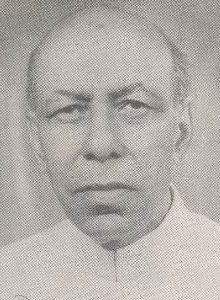 Moin Ahsan Jazbi
Moin Ahsan Jazbi
(Muʻīn Aḥsan Jaz̲bī)
1912 – 2005
 Moin Ahsan Jazbi
Moin Ahsan JazbiMoin Ahsan Jazbi (Muʻīn Aḥsan Jaz̲bī; 1912-2005; also Moin Ehsan/Ihsan Jazbi) was born Moin Ahsan (Muʻīn Aḥsan) in at Mubarakpur, Azamgarh District, in what is today Uttar Pradesh. He developed an early interest in poetry, memorizing poets such as Ghalib and having started writing at age nine, then started writing it in earnest.
At the age of seventeen in 1929, he wrote “Fitrat ek muflis kī naẓar men̲” (Nature as Viewed by a Poor Man),* a poem which brought him serious literary attention. He published a number of his poems in the monthly journal Hindūstān, edited by journalist-politician Hayatullah Ansari (1912-99). He received his B.A. from Anglo-Arabic College, Delhi, in 1932, then his M.A. in Urdu in 1934 from Aligarh Muslim University. After briefly teaching, he joined the editorial staff of Āj kal (Nowadays as an assistant editor. He returned to Aligarh for his Ph.D., which he received in 1938 with a dissertation, Ḥālī kā siyāsī shuʻūr (Hali’s Political Awareness); it was revised and subsequently published in 1959. He was an early supporter of the Progressive Writers’ Association, which he learned about from Ali Sardar Jafri (1913-2000) and Sibte Hasan (1916-86). He joined the Department of Urdu, Aligarh Muslim University, in 1945 and retired as Reader in Urdu in 1974.
He wrote three major collections of poems: Firozān̲ (Resplendent Things; 1951), Sukhun-i muḵẖtaṣar (Words, Briefly; 1960), and Gudāz-i shab (Evening Melting; 1985). He excelled in both the ghazal and the naz̤m, as shown in two of his best-known poems, the ghazal “Marne kī duʻāen kyūn” (Why should I pray for death)* and the naz̤m “Maut” (Death).* Like many of his Progressive colleagues, he wrote poems which have been set to music and used in films; for example, poems by both Jazbi and Faiz Ahmed Faiz were set to music for the film Cānd sūraj (Moon Sun; 1970).
See Tabish Ahsan Jazbi, “Moin Ahsan Jazbi: The Renowned Shayer,” 4 Nov. 2009 and Mushtaq Sadaf, Moin Ahsan Jazbi (2017).
1. Bezar nigāhen̲ / Fed-Up Glances
2. Cashm-i savāl / Eye Full of Questions
3. Fitrat ek muflis kī naẓar men̲ / Nature as Viewed by a Poor Man
4. G̲h̲azal: ʻAish se kyūn̲ k̲h̲ush / Ghazal: Why are we always happy
5. G̲h̲azal: Ham dahr ke is virāne / Ghazal: Whatever we see in this wasteland
6. G̲h̲azal: Marne kī duʻāʼen̲ kyūn̲ / Ghazal: Why should I pray for death
7. G̲h̲azal: Mashʻal the shajar-i ẓulmat / Ghazal: The moon and those stars

